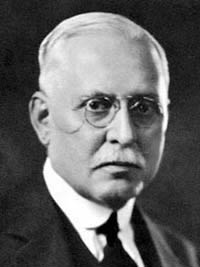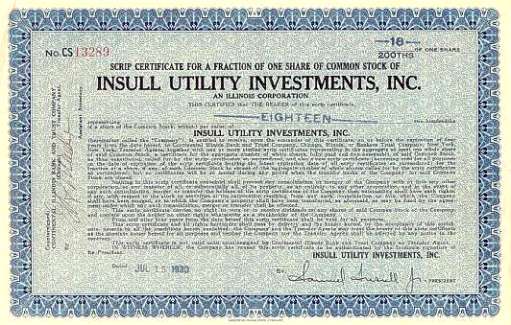
HR-6 and the Swing Era
Above: Samuel Insull, con-man extraordinaire
Hello Retro Enthusiasts,
The National Energy Policy Act of 2005 has the following deep inside its innards:
Sec 16043: The Public Utility Holding Company Act of 1935 is repealed.
That's it. Just one sentence. Doesn't mean much, huh?
Well, there's a Swing Era story behind this, because Congress passed this law,which has lasted for nearly 70 years, because of one man, a fellow named Samuel Insull:
Samuel Insull was born in London, England in 1859, the son of a Congregationalist who held a minor post at Oxford. At the young age of 14, young Sam became a secretary and bookkeeper at an auction firm. In 1879, he became a secretary for George A. Gouraud, one of Thomas Edison's agents in England. Edison was one of young Insull's idols and he strived to ingratiate himself with Edison's staff. He came to America in 1881 at age 22 to be Edison's personal secretary. Insull had a gift for synthesizing concepts and quantities of data into workable business operations, which Edison recognized. By 1889 Insull became vice-president of Edison General Electric Company in Schenectady, N.Y. Insull's reputation as a business dynamo was so well known that when financier J.P. Morgan took over Edison's power companies in 1892, Insull was sent west to Chicago to became president of the struggling Chicago Edison Company. .
Ultimately, Insull created the Middle West Utilities Corporation, a holding company that eventually acquired hundreds of utilities and traction companies.

Electric Traction Railroad
The two types of companies were a perfect pair: the electric traction (i.e. streetcars) companies represented captive customers to the utilities companies and would in turn generate further development along their routes which would in turn create more customers for the utilities companies.
[Aside: Amusement parks were often built at the end of the streetcar lines to "capture" large parcels of land for speculative purposes. The park would generate income until the suburbs advanced to that location; then the streetcar line would be extended and the process repeated. This strategy was played out here in DC, and explains precisely why Glen Echo is where it is and why it was "dumped" on the Park service when the streetcar lines went bust]At one time, Insull's minions were getting schoolchildren to save their pennies for fractional shares of stock in these over-inflated holding companies.

Fractional Share Stock Certificate
"18/200th" of a Share
At the same time, Insull tried to keep electricity service confined to the cities where it could be produced at minimal cost and sold at maximal price. When the stock market crashed in 1929, Insull had to turn over Utility Investments Inc. to his creditors. Resigning from 60 corporations and facing an indictment, Insull left the country. Although he was acquitted of embezzlement, fraud, and violation of the Bankruptcy Act, Insull became an example of the corruption and fraud which contributed to the Great Depression. The revelation of corporate duplicity brought to light during the Insull investigations led to a public outcry for reform and helped to assure the creation of the Tennessee Valley Authority and the Rural Electrification Administration to provide inexpensive power to all parts of the United States.
The above-referenced Public Utility Holding Company Act of 1935 (15 U.S.C 79 et seq) was enacted and stood as a guardian to keep power companies in the business of supplying electricty rather than feeding Wall Street greed.
I suppose that things have probably changed, but when you look at Enron, it looks to me that things are pretty much the same.
This probably affected most of you, but you don't realize it. Given the prevalence of stock speculation in the 1920s, it is quite probable that many of your grandparents had invested at least part of their life savings in Utilities. When these investments were wiped out, it made an indelible impression on your parents in loss of lifestyle. (How did the dot com collapse affect your life view?) Your parents may have passed some of this anxiety to you in the form of excessive concern with safety and stability. Some of your parents may have escaped the unpleasant realities of the Depression by frequenting low dives where Jitterbug Dancing was permitted...
Samuel Insull is probably why your mother calls up all the time to bug you about getting married or having a "job with a Future."
Following the government's failure to convict him, Insull became an expatriate. Ironically, he died of a heart attack on a Paris subway in 1938. He had no money on his person.
The wooden stake will stay is out Insull's heart -- look for corporate shenannigans to rival ENRON...
Meanwhile, there is a new book out on the complex subject of Samuel Insull.
John F. Wasik, The Merchant of Power: Sam Insull, Thomas Edison, and the Creation of the Modern Metropolis.
The New York Times writes: "...One accomplishment of John F. Wasik's The Merchant of Power is to remind us that before there was power coming out of the wall, someone had to develop and finance generating stations...The timing of Mr. Wasik's book would seem to be perfect..."
Home | About Lindy | 1940s Collectibles | Upcoming Events | Vintage Clothing
The Guide - Establishments - Travel - Accessories
Music | Links | Photo Gallery | Extras | Contact